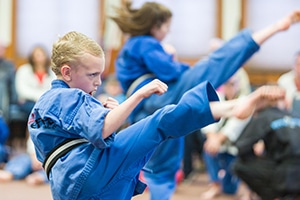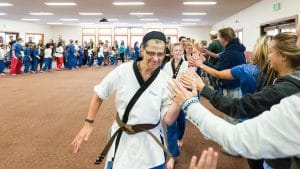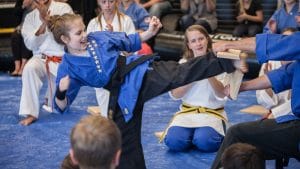In the six months before their test for Black Belt, Ripple Effect Martial Arts students undergo a battery of training exercises known as “Prep Cycle.” Most are physical. Lots of it is mental, learning to endure pain, confusion, weariness in pursuit of your goal.
But one element is expressly philosophical, an essay that asks students, some as young as five or six, to answer: “What does Black Belt mean to me?”
Philosophical reflection in the martial arts has a long tradition, with roots in Sun Tzu’s The Art of War and famous samurai treatises like the Hagakurai. Modern day expressions on the meaning of Black Belt range from kickboxing champion Benny “the Jet” Urquidez to practitioners of Brazilian Jiujitsu.
Obviously, the exercise is meaningful for a martial artist of any style–even those that don’t use a belt system. It provokes questions like: What challenges have you overcome as a martial artist? What pushes you to be better? Why get back up when you get knocked down?
Here are some reflections, in their own words, from students who will be testing at the April Black Belt Immersion.

On Squashing Negative Thoughts
“During my board break at red belt I was having very negative thoughts, telling myself I couldn’t break the board. On the outside I was laughing, joking about how much my hand hurt, but on the inside I was bawling and yelling at myself for being so stupid, for embarrassing myself. At last Mr. Worth came over, held the board up, and told me to kick through and hit his chest. I stood there, bewildered. Then he yelled at me to do it. I was so surprised and scared that the negative thoughts vanished. I threw myself at the board, and snapped it in half.” —Ann
On Helping Others
“Humility is something I’ve seen in all Ripple Effect Black Belts, helping others achieve their goals. One of my favorite prep cycle assignments has been the Hero Project. Spending time with a student to help him pass his test has been one of the many joys of [training toward] Black Belt.” —Adam
On Self-Confidence
“Looking back to my first introductory class at karate I would have to say I was really scared. It’s been four years since then, and I’m still a little scared. [But I] look at the black belts and they’re always confident, positive, encouraging and helpful. Black Belts set the example in how they look, talk, listen and react.” —Lily
On Building Good Character
“[Black Belt] character traits can be used for everything in life. Learning to persevere when things get tough. Taking responsibility for your actions. Martial arts training and culture [cultivates these] values in children and adults.” —Jenn
Becoming a black belt happens long before you first tie yours on. You have to envision it. It’s more proverbial than paradoxical to say: Train like a Black Belt to become a Black Belt.



